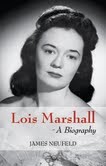 Lois Marshall: A Biography
Lois Marshall: A Biography
by James Neufeld
Dundurn Press
352 pages, photos; $28.99
When Canadian soprano Lois Marshall first showed up at Sarah Caldwell’s Boston Opera Group to sing Mimi in Puccini’s La Bohème, Caldwell took one look at her and blurted out, “This is wonderful. I’ve always wanted to have a Mimi who was really sick.” Caldwell was not known for tact. But her comment, as related in James Neufeld’s eloquent and moving biography of Marshall, suggests how much Marshall could have done in opera if more directors had been willing to work with her impairment.
Childhood polio left Marshall with a limp. But it certainly did not stop her from a busy career in recitals and oratorios, as a particular favourite of Ernest MacMillan, Beecham and Toscanini. Nor did it stop her from frequently touring Europe, Japan, and the Soviet Union, where she was adored.
But Marshall’s disability did prevent her from having an operatic career. Neufeld presents her as not just a great singer, but a convincing actress as well, who could interpret an operatic role as convincingly as a Strauss lied or a Bach aria. Neufeld makes a convincing case that, with her powerful voice, dramatic temperament, phenomenal memory and lovely stage presence, Marshall would have been a great opera singer, had she been given the opportunities.
Instead, starting from Arnold Walter’s refusal to admit her into the Royal Conservatory’s Opera School, “Canadian opera producers simply missed the boat.” If today Joyce DiDonato can give a convincing performance of Rosina in a wheelchair at Covent Garden, as she did last summer after she broke her leg on stage during the opening night of Rossini’s Barber of Seville, then surely opera directors could have accommodated Marshall’s disability.
Using his extensive interviews with Marshall’s family members, friends and fellow musicians, as well as his own experiences hearing Marshall live and on recordings, Neufeld conveys both the communicative power of Marshall’s singing and the “warmth and sunshine” of her personality. But Neufeld’s most revealing source is the unpublished memoir Marshall drafted at the end of her career.
Neufeld, who teaches English at Trent University, writes insightfully about Marshall’s accomplishments. With a novelist’s flair, he delves into Marshall’s complicated relationship with her long-time teacher and accompanist, Weldon Kilburn. Soon after they finally married in 1968 their relationship unravelled. As her musical partner, Kilburn had been supportive and sensitive, but as a lover he proved to be inconstant and heartless. “Though Lois seldom performed opera,” Neufeld comments, “her romantic life seemed to be caught up in one.”



